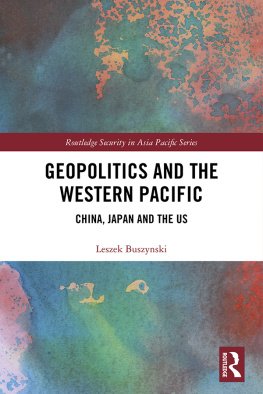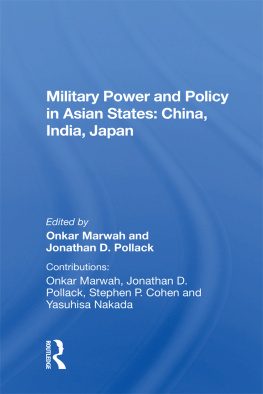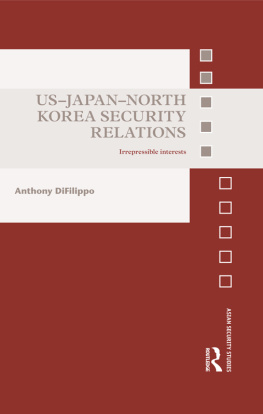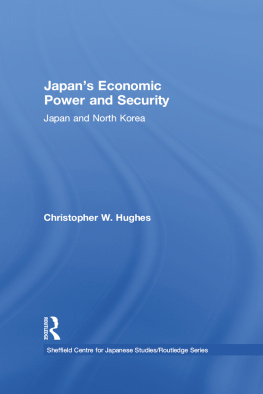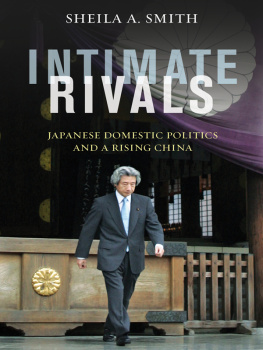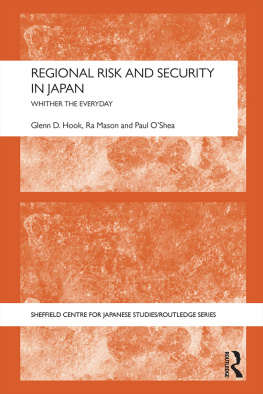JAPAN REARMED
The Politics of Military Power
Sheila A. Smith
A Council on Foreign Relations Book

Cambridge, Massachusetts
London, England
2019
Copyright 2019 by the President and Fellows of Harvard College
All rights reserved
Cover photo: Members of Japans Self-Defence Forces Infantry unit march during the annual SDF ceremony at Asaka Base, Japan, October 23, 2016. REUTERS / Kim Kyung-Hoon.
Cover design: Jill Breitbarth
978-0-674-98764-7
978-0-674-24060-5 (EPUB)
978-0-674-24061-2 (MOBI)
978-0-674-24059-9 (PDF)
The Council on Foreign Relations (CFR) is an independent, nonpartisan membership organization, think tank, and publisher dedicated to being a resource for its members, government officials, business executives, journalists, educators and students, civic and religious leaders, and other interested citizens in order to help them better understand the world and the foreign policy choices facing the United States and other countries. Founded in 1921, CFR carries out its mission by maintaining a diverse membership, with special programs to promote interest and develop expertise in the next generation of foreign policy leaders; convening meetings at its headquarters in New York and in Washington, DC, and other cities where senior government officials, members of Congress, global leaders, and prominent thinkers come together with CFR members to discuss and debate major international issues; supporting a Studies Program that fosters independent research, enabling CFR scholars to produce articles, reports, and books and hold roundtables that analyze foreign policy issues and make concrete policy recommendations; publishing Foreign Affairs, the preeminent journal on international affairs and U.S. foreign policy; sponsoring Independent Task Forces that produce reports with both findings and policy prescriptions on the most important foreign policy topics; and providing up-to-date information and analysis about world events and American foreign policy on its website, www.cfr.org.
The Council on Foreign Relations takes no institutional positions on policy issues and has no affiliation with the U.S. government. All views expressed in its publications and on its website are the sole responsibility of the author or authors.
The Library of Congress has cataloged the printed edition as follows:
Names: Smith, Sheila A., 1959- author.
Title: Japan rearmed : the politics of military power / Sheila A. Smith.
Description: Cambridge, Massachusetts : Harvard University Press, 2019. | Includes bibliographical references and index.
Identifiers: LCCN 2018042063
Subjects: LCSH: JapanArmed ForcesHistory20th century. | JapanArmed ForcesHistory21st century. | JapanMilitary policy. | Japan. Kenp (1946) | JapanForeign relationsUnited States. | United StatesForeign relationsJapan.
Classification: LCC UA845 .S625 2019 | DDC 355.00952dc23
LC record available at https://lccn.loc.gov/2018042063
For Ralph Edward Smith
CONTENTS
ADIZ Air Defense Identification Zone Antiterror Law Antiterrorism Special Measures Law APEC Asia Pacific Economic Community ARF ASEAN Regional Forum ASDF Air Self-Defense Force BADGE Base Air Defense Ground Environment BMD Ballistic Missile Defense C3I Command, Control, Communications, and Intelligence CLB Cabinet Legislation Bureau DPJ Democratic Party of Japan DPRK Democratic Peoples Republic of Korea EEZ Exclusive Economic Zone G-7 Group of Seven (United States, United Kingdom, Japan, Italy, Germany, France, Canada) GCC Gulf Cooperation Council or Cooperation Council for the Arab States of the Gulf GDP Gross Domestic Product GHQ General Headquarters GSDF Ground Self-Defense Force HNS Host Nation Support IMO International Maritime Organization INF Intermediate-Range Nuclear Forces IRAF Iraq Reconstruction Assistance Force Iraq Special Special Measures on Humanitarian and Measures Law Reconstruction Assistance in Iraq ISR Intelligence, Surveillance, and Reconnaissance JCG Japan Coast Guard JCP Japan Communist Party JCS Joint Chiefs of Staff JICA Japan International Cooperation Agency JSP Japan Socialist Party LDP Liberal Democratic Party METI Ministry of Economy, Trade, and Industry MINUSTAH United Nations Stabilization Mission in Haiti MITI Ministry of International Trade and Industry MLIT Ministry of Land, Infrastructure, Transport, and Tourism MOD Ministry of Defense MOF Ministry of Finance MOFA Ministry of Foreign Affairs MSA Maritime Safety Agency MSDF Maritime Self-Defense Force MSO Maritime Security Operations NATO North Atlantic Treaty Organization NDPO National Defense Program Outline NGO Non-Governmental Organization NPT Treaty on the Nonproliferation of Nuclear Weapons NSC National Security Council ODA Official Development Assistance PAC-3 Patriot Advanced Capability-3 PKO Peacekeeping Operations PLAN Chinese Peoples Liberation Army Navy PRC Peoples Republic of China ReCAAP Regional Cooperation Agreement on Combating Piracy and Armed Robbery against Ships in Asia RIMPAC Rim of the Pacific Exercise ROC Republic of China ROE Rules of Engagement ROK Republic of Korea SACO Special Action Committee on Okinawa SCAP Supreme Commander for the Allied Powers SDF Self-Defense Force SDP Social Democratic Party SLBM Submarine-Launched Ballistic Missile SOFA Status of Forces Agreement SOSUS Sound Surveillance System TPP Trans-Pacific Partnership UK United Kingdom UN United Nations UNCLOS United Nations Convention on the Law of the Sea UNHCR United Nations High Commissioner for Refugees UNMISS United Nations Mission in South Sudan UNOMOZ United Nations Operation in Mozambique UNTAC United Nations Transitional Authority in Cambodia UNTAET United Nations Transitional Administration in East Timor USAID United States Agency for International Development USSR Union of Soviet Socialist Republics WMD Weapons of Mass Destruction
MORE THAN SEVENTY YEARS after the atomic bombings of Hiroshima and Nagasaki, the Japanese people remain deeply skeptical of the benefits of military power. When Barack Obama became the first sitting U.S. president to visit Hiroshima in May 2016, he spoke of the horror of the use of force in the nuclear age: Seventy-one years ago, on a bright cloudless morning, death fell from the sky and the world was changed. A flash of light and a wall of fire destroyed a city and demonstrated that mankind possessed the means to destroy itself. Why do we come to this place, to Hiroshima? We come to ponder a terrible force unleashed in a not so distant past. The Japanese people welcomed his visit and overwhelmingly approved of his message. As more nations gave into the temptation of acquiring nuclear weapons, Japan steadfastly resisted and became a staunch advocate of the Nuclear Nonproliferation Treaty.
Generations of postwar Japanese leaders have grappled with how to ensure their nations defenses in the nuclear age while limiting the power of its military. The Japanese constitution remains as it was written in 1947, with Article Nine committing the Japanese people to eschew the use of force to settle international disputes. Prime Minister Abe Shinz reciprocated Obamas visit to Hiroshima in December 2016 by visiting the site of the Japanese attack on the United States. At Pearl Harbor, Abe repeated a commitment that Japanese leaders have made for three-quarters of a century: We must never repeat the horrors of war again. This is the solemn vow we, the people of Japan, have taken. Since the war, we have created a free and democratic country that values the rule of law, and have resolutely upheld our vow never again to wage war. We, the people of Japan, will continue to uphold this unwavering principle while harboring quiet pride in the path we have walked as a peace-loving nation over these seventy years since the war ended.


